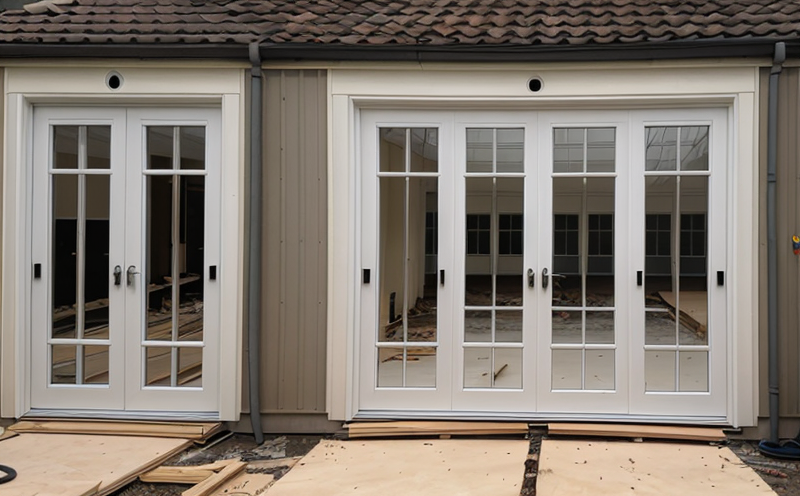Certification and Compliance Testing of Partition Walls
The importance of partition walls in fire safety cannot be overstated. These structures play a vital role in providing structural integrity, minimizing smoke movement, and ensuring the protection of life within buildings during fires or other emergencies. This service focuses on the rigorous testing required to certify these partitions as compliant with international standards for fire resistance.
Partition walls are subjected to intense heat and flames, which can vary based on specific conditions such as the type of fire, duration, and intensity. The goal is to ensure that the wall maintains its structural integrity and provides a barrier against smoke and heat transfer. This testing involves exposing the partition wall to controlled fire environments using standardized methods.
The process typically begins with the selection of appropriate test specimens based on their intended use in buildings. These specimens are then prepared according to the requirements specified by relevant standards such as ISO 834 and ASTM E119. The testing environment is carefully calibrated to simulate real-world fire scenarios, ensuring accurate results that reflect actual performance.
During the test, various parameters are monitored including temperature rise on the unexposed side of the partition wall, flame spread, smoke production, and structural integrity. Compliance with specified limits for each parameter determines whether a partition wall meets the necessary criteria for certification. If any part fails to meet these standards, corrective measures must be taken before retesting.
Once all tests have been completed successfully, detailed reports are generated documenting every aspect of the testing process and results achieved. These documents serve as proof that the tested partition walls comply with relevant fire safety regulations both nationally and internationally recognized bodies like ISO, ASTM, EN, and IEC.
The information provided in these reports is crucial for architects, engineers, builders, and other professionals involved in designing and constructing fire-safe buildings. It ensures compliance with local building codes while also meeting international standards ensuring consistent quality across different regions worldwide.
Scope and Methodology
| Parameter | Description |
|---|---|
| Temperature Rise | The maximum temperature increase on the unexposed side of the partition wall during testing. |
| Flame Spread | The rate at which flames spread across the surface of the partition material. |
| Smoke Production | The amount of smoke generated by the partition when exposed to fire. |
| Structural Integrity | The ability of the partition wall to maintain its structural stability under fire conditions. |
| Time to Failure | The duration until the partition fails completely, either structurally or functionally. |
| Material Type | The specific type and composition of materials used in constructing the partition wall. |
| Test Duration | The length of time over which the test is conducted to evaluate long-term performance. |
The scope of this testing encompasses a comprehensive evaluation of the fire resistance properties of partition walls. This includes assessing their ability to withstand high temperatures, resist flame spread, and maintain structural integrity throughout prolonged exposure to intense heat sources. By adhering strictly to prescribed procedures outlined in recognized standards like ISO 834 and ASTM E119, we ensure accurate and reliable test results.
The methodology employed ensures consistency across all tests conducted, allowing for meaningful comparison between different samples or designs. This approach guarantees that only those partition walls meeting stringent criteria are deemed compliant with applicable regulations.
Industry Applications
Certification and compliance testing of partition walls is essential in various industries where fire safety remains a paramount concern. Architects, engineers, and builders rely on this service to ensure that their designs incorporate partitions capable of providing effective protection against fires.
In commercial buildings, these tests are crucial for ensuring that office spaces, retail areas, and other public environments remain safe from the threat of fire. Similarly, in residential properties, partition walls contribute significantly towards safeguarding lives within homes during emergencies.
Healthcare facilities like hospitals and clinics also benefit greatly from this testing as they house critical equipment and personnel whose safety must be prioritized above all else. Educational institutions such as schools and universities need partitions that can protect students and staff in case of accidental fires or other incidents.
The aerospace industry relies heavily on fire-resistant materials for constructing aircraft interiors, engines, and other components where even small flames could pose significant risks. Transportation systems too require robust partition walls to separate compartments effectively during emergency situations.
By providing reliable certification services for partition walls, we contribute significantly towards enhancing overall fire safety standards across multiple sectors ensuring peace of mind for all stakeholders involved in creating safer environments.
International Acceptance and Recognition
The certification and compliance testing of partition walls holds significant value not just domestically but also internationally. Many countries recognize the importance of adhering to globally accepted standards when it comes to fire safety measures within buildings.
Standards such as ISO 834, ASTM E119, EN 1363-3, and IEC 60695 provide a framework for conducting these tests consistently across different regions. Compliance with these standards not only enhances the credibility of your product but also facilitates easier entry into foreign markets.
By obtaining certifications from recognized bodies like Underwriters Laboratories (UL) or Factory Mutual Research Corporation (FMRC), you demonstrate commitment to maintaining high levels of fire safety within your products. Such recognition can significantly boost brand reputation and customer confidence when dealing with international clients.
Achieving international acceptance for partition wall testing underscores the importance placed on ensuring consistent quality standards worldwide. This approach helps promote safer living conditions globally, fostering trust between manufacturers, end-users, regulatory authorities, and the general public alike.





